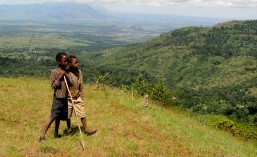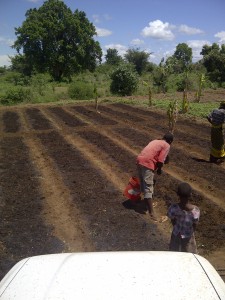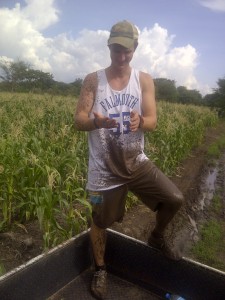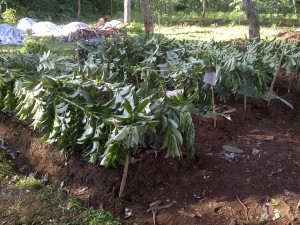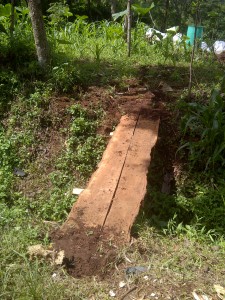It has been too long since I was last able to post an update about our progress in Mkyashi. I have been kept away from the internet by a wicked bout of food poisoning, hassles by immigration, network outages, power outages, a rainy season that sometimes shuts down transportation on and off the mountain, and a lot of really great progress here on the mountain. Still, I apologize to everyone who has donated their money, time, expertise, advice, and all other forms of support to TPM. I owe it to all of you to keep these updates more regular and I will do my best going forward.
Since we first met with Deo – leader of the gardening project in Kahe – to start training and begin implementing the project in Mkyashi it has taken over our efforts. In fact, I have decided to put the other projects we were working on – working with entrepreneurs and community banks – temporarily on hold to ensure the success of the gardening program. My team and I are very excited about the potential of the gardening project and I want to make sure it is given a solid foundation. If we can support this program sufficiently from the start it can continue for years under local leadership. That’s the kind of program we like at TPM. However, a solid foundation requires funding and time. Thus, I am dedicating the next few months to the gardening project to ensure it receives the time and funding required for it to be outrageously successful for years to come. After a few months I should have a better idea of how much of our budget is still available to work with entrepreneurs and community banks.
There is a lot of training and labor that goes into the gardening program at the start to set the foundation of infrastructure, knowledge, and organization. Before I get into our progress so far, let me give a recap of the program to make sure everyone fully understands exactly what it is.
The gardening program (we have been speaking with people locally to create a formal name for the program in Mkyashi) is all about helping families begin and maintain organic vegetable gardens. The program begins by setting up a gardening center. The garden center contains a show garden that can be used to educate and display the benefits of organic gardening. It also has a nursery, a compost making operation, and a garden shop. I will get into each of these components more in a bit. For now, the important thing is that after a couple of years of funding from TPM this whole operation has the potential to operate independently as a profit-generating social enterprise in Mkyashi. The garden center promotes organic gardening and spreads knowledge about its benefits and best practices. Mary is currently being trained to run the garden center.
The other important role of the garden center is to help selected families start their own gardens. Families are selected based on economic need, ability and willingness to maintain a garden, and ability and willingness to spread what they learn to other families. For select families TPM will provide funding and other resources to help families start their own organic vegetable gardens. The gardens are designed using the FAITH (Food Always In The Home) Garden method. The idea behind the gardens is that they provide a constant source of food and income for families. Most farmers in Mkyashi plant crops that they will harvest all at once. This means throughout the year their food and income is very volatile. FAITH Gardens provide daily food sufficient for a family of six throughout the year.
Selected families will receive full training on how to start and maintain their gardens and Mary will make regular mentoring visits to check on the progress and status of gardens. The beauty of the program is that while each family we assist gets a vital source of food and income, they also become customers at the garden shop, ensuring its sustainability. They also become excellent word of mouth marketers for other people interested in organic gardening.
So what have we done to date?
We started off with a number of visits to Kahe. Kahe is a village just outside of Moshi that has already started a FAITH Garden program. In Kahe we learned the basics of how to make great organic compost, how to plant a successful garden, how to select the best families to assist, and everything else we would need to begin the program in Mkyashi. Undoubtedly we will tweak the program – what works in one village doesn’t necessarily work in another – but the foundation will be the same. After a few visits to Kahe we went down for two days and actually planted a full garden with a family. It was a great experience and left us excited to start planting gardens in Mkyashi.
The first step in starting the program in Mkyashi was to begin our own compost making operation. Compost requires 6-8 weeks to go from individual inputs to quality decomposed compost. So before we could even start our show garden we needed to start our compost. Right now we are about three weeks away from our compost being ready. Then it’s full speed ahead with the show garden. Meanwhile, Friday has become Compost Day. Every Friday we turn over and water our existing compost piles and make between two and six new piles. Each garden requires at least six piles of compost 2-4 times per year. We want to make sure we always have enough compost on hand for the show garden and for the families who we will be helping to plant gardens. Any extra compost will be for Mary to sell in the garden shop.
Along with starting to make compost we have also started a nursery. Some plants are more successful when they have been started in the safety and controlled conditions of a nursery. The nursery is covered to shelter young plants from harsh sun and rains and the soil is burned to kill any bacteria that will challenge the young plants. After 2-3 weeks nursery plants are transferred to plastic bags for another 1-2 weeks before they are ready to be planted in gardens. Some of the plants in our nursery will be for our own show garden and any extras will again go to the garden shop.
Even though we are still three weeks away from planting our own garden, we have already begun cultivating, aerating, and otherwise preparing our garden plot. It’s early, but we want to make sure we have time to deal with any unforeseen issues so that we can stick to our timetable. So far there have been plenty. We had to build a bridge over a small stream to make transport of water and other inputs easier and we had about eight tree stumps that needed to be removed. That’s a big task when your only tools or shovels, machetes, and axes. We also had a lot of work to do to level the area so that rain would reach each plant equally. Things are looking good now and we are anxious for the next few weeks to pass quickly so we can begin planting.
Finally, we have also begun making some other important inputs into the process. Organic pesticides and boosters help ensure that organic crops look just as healthy and hearty as their chemically enhanced counter parts. Their production requires the collection of things like ginger, aloe vera, fish guts, molasses, vinegar, and other strange ingredients. Again, these can be used for the show garden and family gardens as well as sold in the garden shop.
We are still a month or two away from the opening of the garden shop, but we are really excited for its potential. The garden shop will be what eventually sustains the whole program and makes organic vegetable gardening possible in Mkyashi. It will sell organic compost, pesticides, and boosters and will also sell their inputs for people who want to make those products on their own. It will sell healthy organic seedlings from its nursery and will also sell basic gardening supplies like watering cans, shovels, and spades. Currently those products are not available locally. The garden shop will also be a place people can go to receive advice about their gardens.
So, it has been a very busy month of preparation and the next month promises to be just as crazy. On top of the gardening project a few other issues – both good and bad – have come up.
First the bad: immigration. The Office of Immigration is known throughout Tanzania as one of the most inefficient and corrupt offices in the country – which says a lot given the other offices. My three month tourist visa expires at the end of April, so we need to have everything sorted out before then. I first went into the immigration office here a week after I arrived in February. Since that time they have thrown every expense, delay, and other inconvenience they can conjure up at me trying to induce a bribe. With just a week left on my visa, we have one more meeting which they are saying will be the final necessary meeting before they will begin processing my Volunteer Permit that will allow me to stay in the country through November. A group of six people from Mkyashi are currently in the meeting as I write this message. Hopefully everything goes well.
Next the good: You can declare that you are temporarily slowing down the entrepreneurship program, but the entrepreneurs will keep on entrepreneuring. Mama Regan, whom we helped securing funding from her employer to start a small business selling mndazis, is expanding her business. Mndazis are like large doughnut holes and are a cheap and popular breakfast food in Tanzania. Currently Mama Regan cooks at home, puts her mndazis in a bucket, and sells them on the side of the road. She now has funds to build a small shack on the side of the road to cook mndazis in. That means she will be able to sell hot, fresh mndazis. The smell coming out of the shack will be her marketing.
We have also worked with Babu Lyimo to help him figure out if a new enterprise he wants to start could be profitable. He is considering getting rid of all of his large livestock – cows and goats – and replacing them with a rabbit farm. Cows and goats require a lot of input and their value has been decreasing. Rabbits are more rare and may generate more profit for him. They require much less inputs and are much loved for their tender meat. After a few weeks of discussions Babu Lyimo has decided he wishes to move forward with this new plan and we are now working with him to determine the best way to make it a success.
Finally, a third entrepreneur, Cynoc, is interested in experimenting with growing vanilla. Vanilla can be an excellent cash crop in the right conditions. We are working with Cynoc to run a small pilot program to see if vanilla is a viable crop for Mkyashi. If it is he is ready to expand his small operation and it could be something we incorporate into the vegetable gardens. Many of the growing techniques are the same.
Hopefully the next update won’t be for an entire month and thus will run much shorter. Thanks to everyone for the continued support.
